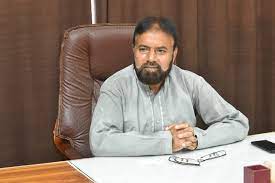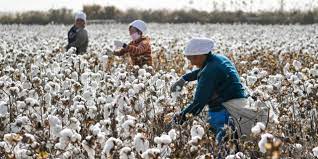Revival of cotton within sight: Expert

China Economic Net
Lahore: Following a decline in cotton planting area and production last year, expert is expecting a revival of cotton in the next few years.
Dr. Zahid Mehmood, Director Central Cotton Research Institute, Multan told China Economic Net (CEN) in an interview that this year, the production will be around 10 billion bales. In the next two years, Pakistan will be able to achieve the previous production rate, which was around 14 to 15 billion bales.
“The weather conditions are appropriate this year. The government has announced the fixed lowest price at 5,000 or more per mound. If the price falls from the fixed price, then the government will intervene and purchase the cotton. Next year or maybe this year, we are expecting the revival of cotton”, he said.

The institute is also collaborating with China in the training of scientists and improving labs of biotechnology for the transfer of gene technology, he added. He suggested that radio stations be installed for the cotton growers to provide the information and guideline to the cotton growers regarding new trends and challenges to the crop.
More than 40% of Pakistan’s employment depends on the cotton crop. Cotton is a source of income for unemployed women as well.
However, over the last decade or so, the area under cotton cultivation has been declined and replaced by its competing crops like sugarcane, maize, potato and rice. During 2021-22, the cropped area declined by 6.8 percent y-o-y to 1,937 thousand hectares.
“Last year, cotton got very short and we had to import more than 50% of cotton. The consumption was 14 million bales, but the production was 5.6 to 5.7 million”. Mr. Muhammad Abdullah, Executive Director, Sapphire Fibers Ltd. Told CEN reporter.
According to him, the sowing area was 20% less than the target. More importantly, unfavorable weather conditions such as rain or heat stress undermined the production per unit.
“The most important is the seed. Such seeds should be developed that have greater recovery capacity and be less vulnerable to pest attacks and weather misadventures”, he suggested. The problems cotton farmers are facing are mainly due to the shift in weather, but the conventional seeds are still being used. “The month in which we require less temperature, the temperature increased, which caused problems. Scientists are doing the research in collaboration with Chinese experts”, he told CEN.
After that, machinery picking can be promoted in a wider scope. Mr. Muhammad Abdullah said that cotton in Pakistan cannot be used for many products only because of contamination. “Contamination means when some fibers or any material other than cotton enters in cotton. It includes polypropylene, pieces of synthetic fabric or dyed fabric. It occurs due to manual picking”, he explained.
“If you shift from manual to mechanical picking, you will get advantages from the industrial point of view as well as from the product point of view. If there is mechanical picking as in China and the developed countries, they pick mechanically, make modules and transfer it to ginning factories, there are no chances of any substance entering or any contamination. Mechanical picking should be promoted on the governmental level, since local farmers cannot afford it”, he added.
The consumer market is still hot. Sapphire Fibers Ltd. has sold their product for the next three months in advance, with more than 80% for export and the remaining 15-20% for the local market.
“The challenge we face here is related to customer requirements. For this, we have to gather all the technical demands by engaging consultants from various countries. I think if we have good technical collaboration with China then the transformation of knowledge may take place between China and Pakistan. Similarly, I have heard and seen that China is doing great in terms of efficiency. I think we can adopt their practices here as well. The more efficient and productive setup we have, the better we will be able to compete in the world in our product and cost”, Irfan Milk, Plant Head of the company, said.





